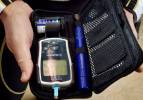Southern Nevadans with ties to West Africa lament Ebola’s toll
Ebola haunts Liberia native Daniel Sumo even though the virus poses no more of a heath threat to him than anyone else in the United States.
For Sumo, Ebola is a personal nightmare, not a medical problem or a political issue. The 32-year-old porter on the Strip lost his best friend to Ebola hemorrhagic fever, which routinely denies its victims the dignity of a funeral or a cemetery plot for mourners to mark the dead.
“I don’t like to talk about it because he’s the longest-time friend I’ve ever had,” Sumo says. “It just makes me sad to talk about it.”
His mother, brothers and sister in his hometown of Monrovia, Liberia, face an uncertain future as the pathogen continues to menace their fragile land.
Sumo is among a small number of Southern Nevadans who don’t need television images to visualize Ebola’s victims, people who have a personal link to Guinea, Sierra Leone and Liberia, the countries at the center of the current outbreak.
They are Liberian expatriates, a community estimated at several hundred people. They are longtime Las Vegas churchgoers who worry daily about 19 orphans whose marginal existence has been complicated further by the health crisis. They are service club members, educators and entrepreneurs familiar with life in any developing country, let alone one facing a health emergency.
“It couldn’t happen in a place that could deal with it any less,” said Alan Bowman, the retired principal of Walker Elementary School in Henderson who went on a medical mission to Monrovia last year through the Rotary Club. “There’s just no infrastructure.”
Southern Nevadans with ties to the so-called Mano River countries have read the news stories since first cases were discovered in the United States six weeks ago. Nearly all media accounts focus on the remote possibility of Ebola becoming a problem here, not the immense suffering in Africa. And they agonize knowing their loved ones in Guinea, Sierra Leone and Liberia will continue to live under the shroud of Ebola for more than a year before the outbreak abates.
“We didn’t want this virus, but the virus is there,” says Sumo, a U.S. resident since January.
‘THERE’S NO FOOD’
Every Sunday, prayers are offered at churches across the Las Vegas Valley for victims of Ebola, but the appeals made at the Rev. Jackson Jaylah’s New Life Ministries in a storefront on East Desert Inn Road might be the most impassioned. Most of Jaylah’s congregation are Liberian, including Sumo, wife Justine and son Daniel Jr., 5. The congregants hear reports from home about the challenges of finding the basic necessities of life.
“There’s no school. There’s no jobs. There’s no food. There’s no medications,” says Jaylah, a U.S. resident since 2006.
Commerce in Monrovia has been crippled by travel restrictions imposed because of the Ebola crisis, forcing most Liberians to live day to day, hand to mouth. Many Liberians in Las Vegas are sending money to family members so they can buy food, clothing and other necessities.
The stress of the Ebola crisis compounds the heartache for Liberians in Las Vegas. They fear getting a call that starts the harrowing chain of events that Sumo lived through beginning in mid-August.
That’s when Sumo’s friend Augustine called to say his foster mother was sick. She was dead within days of her Ebola diagnosis, and two weeks later, Augustine had a fever, a headache and was suffering excruciating bouts of vomiting.
Sumo, on the phone with Augustine’s wife, Catherine, because Augustine was too sick, told her to get him to a hospital.
“I told her that if it’s anything expensive, I could help her cover the costs,” he said.
Sumo sent Catherine $175 to have Augustine treated at Redemption Hospital in Monrovia. Within a couple of days, Augustine tested positive for Ebola. He was transferred to the Eternal Love Winning Africa Hospital run by Doctors Without Borders. It had 120 beds at the time, with most dedicated to treating Ebola patients. Sumo then called the hospital to speak with Augustine.
“The people at the hospital said that was not possible,” he said. “They told me that was not allowed.”
Desperate to talk to his friend, Sumo got the number for a guard at the hospital who updated Augustine’s condition several times in the ensuing days. The guard kept saying Augustine was improving, but Sumo was suspicious.
Finally, Sumo forcefully asked the guard whether Augustine was still alive. The guard then admitted he had died days earlier but that he thought he might lose his job if he revealed the truth.
About the same time, Catherine fell ill. Sumo feared the news would cause her condition to worsen. Instead of telling Catherine himself, he relayed the information about Augustine’s death to Catherine’s relatives. Within days, Catherine also succumbed to Ebola. Sumo does not know whether she ever found out her husband preceded her in death.
He does not know how the bodies of either friend were disposed, so he never will have a place to pay his last respects.
The Kpaingbas left four children, now living with Catherine’s mother. The youngest is Daniel Sumo’s namesake.
CHURCH DOING ITS PART
Members of Las Vegas’ Faith Lutheran Community Church have been supporting mission projects in Liberia since 2008 and have traveled there annually since 2010.
They are the sole financial support for an orphanage and school in a rented facility outside Monrovia serving 19 children and several hundred members of the surrounding neighborhoods. They’ve watched the children grow, supporting the kids through sponsorships and looking forward to their annual opportunities to become reacquainted.
“It’s all revolved around the relationship with them,” said Linda Kurtz, mission coordinator for the church on Town Center Drive in Summerlin.
The Ebola crisis has complicated Faith Lutheran’s efforts to support the orphanage, and plans to travel to Liberia early next year have been canceled. Costs for providing for the orphans have doubled, and the church is having a fundraiser to offset the added expenses.
After morning services on Nov. 16, comedian Ken Davis will perform, and a silent auction is planned with the proceeds benefiting the church’s mission projects.
Financially, church leaders have budgeted for the orphanage by the quarter, and last year, they were spending about $3,400 every three months. To supply the same level of support this year, the cost of doing business in Liberia has pushed the price to $6,800.
They work directly with partners in Liberia without any of their financial resources diverted to go-betweens or mediators.
Sponsors pay $60 per month to support an orphan, and tuition for school is an additional $25 per month. The long-term plan is to buy land to build an orphanage and school.
Some of the 33 church members who sponsor the orphans have proposed bringing the children to Las Vegas.
Yvonne Angarola, a Realtor with Berkshire Hathaway HomeServices, and the Liberian boy she sponsors exchange emails regularly, and he has asked her for money.
Angarola has resisted, but she admits it’s not easy.
“What’s a small amount to us goes such a long way over there,” she says.
Church leaders have been conflicted about sending money outside their established contacts, but if they deviate from those disbursement channels, they risk creating issues of unfairness and jealousy among the people they are trying to help.
By sending financial support as an organization, they said, their contacts in Liberia ensure that money goes to the neediest families and churches, and is spent in the most equitable manner.
“That’s the hardest thing,” Kurtz says. “How do you say no, as a Christian, to somebody who’s starving? But by saying yes, you’re saying no to something else, so we have to stay committed to our long-term goal.”
IVORY COAST A MAIN CONCERN
The worries probably will continue for many more months. Under worst-case scenario projections, the death toll could reach 250,000 with 1.4 million total cases in the three countries as the outbreak continues into 2016, according to Dr. James Wilson, an infectious-disease forecaster and former technical adviser to the U.S. Department of Homeland Security’s National Biosurveillance Integration Center.
As of Friday, the World Health Organization reported 13,241 cases of Ebola and 4,950 deaths caused by the virus. More than 2,500 of those deaths occurred in Liberia. Wilson says those numbers do not tell the entire story because cases in rural areas of Liberia, Guinea and Sierra Leone have not been tallied.
“The reality is there’s a lot of cases and a lot of fatalities in villages not being reported because of fear,” Wilson says.
The main concern of world health experts is preventing the current Ebola outbreak from spreading into Ivory Coast, which shares a border with Liberia and Guinea and has a population of 20 million — nearly equal to all three countries in crisis. Wilson, a professor in the University of Nevada, Reno School of Community Health Sciences, has downplayed the threat Ebola poses to Americans, but he is frank about the danger abroad.
“Make no mistake, the situation is pretty grave in Liberia,” he says.
The chances for an Ebola vaccine improved greatly once the virus landed on U.S. soil, Wilson says, and the death toll projections could improve dramatically depending on when a vaccine is proved effective and put into production. Experts want the fastest approval to be a vaccine being developed by NewLink Genetics Corp. based in Ames, Iowa, Wilson says, because the company has the best production capacity.
SOUTHERN NEVADANS HELPING
A handful of other Southern Nevadans have visited the countries currently affected by Ebola, and their memories, too, have been tainted by the deadly virus. Bowman, the retired principal who lives in Boulder City, was among the Rotarians on a mission in September 2013. Doctors and Rotary Club volunteers donate their time to provide surgeries in developing countries.
Bowman’s job was to transport patients around St. Joseph’s Hospital, a facility now closed because it was overwhelmed by Ebola patients.
He worked with the head of the hospital, Patrick Nshamdze, nurse Chantal Mutwameme and social worker Tetee Dogba, who all died of Ebola in early August.
“I can’t help but think about Liberia every day,” he says.
Andre Smith, a businessman who has lived in Southern Nevada about 11 years, traveled to Sierra Leone in 2012 to lay the groundwork for his enterprise, Blessed Diamonds. He met with government officials in Sierra Leone to establish a supply of conflict-free diamonds, meaning they are not used to fund wars that have devastated African nations. Smith’s effort was put on hold earlier this year.
“The Ebola crisis pretty much stopped me in my tracks because I was just starting to set up my trade lines,” Smith says.
About 75 former special forces veterans with Kingdom Special Operations are working in Liberia providing humanitarian relief, airport logistics and security, company President Roger Flores said.
The Las Vegas resident owns the company that has provided diplomatic security and other black ops services in several troubled countries worldwide, and about a quarter of Flores’ men in Liberia are from Nevada.
HOPING FOR A BROADER VIEW
As the predominant U.S. focus on Ebola remains in the realm of crisis politics, Southern Nevadans who know potential Ebola victims wish more Americans had a broader world view. They understand, however, why the U.S. media has covered Ebola the way they have.
“I wonder if the general population knows just how bad it is because I don’t think I would have known if I didn’t have my connection to the orphans,” Faith Lutheran’s Barb Brink says.
The Rev. Craig Michaelson, the pastor of Faith Lutheran, hopes the political wrangling doesn’t lead to inaction,because the need is so great. How to handle travelers coming from the Ebola-affected countries and protections for U.S. health care workers are important issues, Michaelson says, but people are dying, and the world response must be robust.
For his part, the Rev. Jaylah doesn’t criticize how Ebola has become a political issue in the United States.
“I’m not frustrated because I know this is a killer disease,” Jaylah says. “It could spread here if people don’t follow an abundance of caution.”
Sumo does express frustration with officials who he says are using hysteria in an effort to attract political support. He wonders why the only Ebola fatality in the United States was from Africa: Thomas Duncan, the Dallas man and the first Ebola case diagnosed here, who died Oct. 8 after returning from Monrovia.
He wants the debate over how to respond to the Ebola crisis to focus on science, not politics.
Sumo was able to emigrate because of the diversity visa program, which promotes a wider range of nationalities in the immigrant pool. The program has drawn as many as 14.8 million applicants in a year and results in 50,000 visas annually.
Sumo is thankful he and his wife and child are in a better place than they were a year ago. He worries about his mother, brothers and sister back home and wonders when he will be able to see them next.
But for now, he carries the bags of the rich and powerful on the Strip, light-years away from virus-ravaged city streets of his youth.
Contact Steven Moore at 702-380-4563 or smoore@reviewjournal.com.
To help
Giving to the Hope for Children Orphanage outside Monrovia, Liberia, through Faith Lutheran Community Church offers a way for Southern Nevadans to help people directly in an Ebola-affected country.
Ken Davis performs at the church at 12:30 p.m. on Sunday at a fundraiser that features lunch and a silent auction. Tickets are $40 per person.
People also can donate money designated to Ebola relief through the American Red Cross, which has an office on Flamingo Road in Las Vegas.
Numerous national and international efforts are under way to respond to the crisis including Doctors Without Borders, Samaritan’s Purse, AmeriCares, UNICEF, Save the Children, Catholic Relief Services and Oxfam. Just last week, Facebook added a donation button designed to make it easier for users to donate to charities battling the disease.
























































